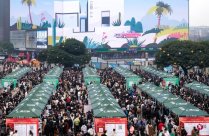This is a "party and government integration" institutional reform again after a large -scale reform five years ago.Scholars of interviewees predict that the institutional reform will further highlight the leadership of the Communist Party of China and weaken the government's power.
Beijing Special Commissioner
The Communist Party of China has held a three -day 20th Second Plenary Session from Sunday (February 26) to prepare for the final two sessions (National People's Congress and the National Committee of the Chinese People's Political Consultative Conference) for the final organization.The list of leaders of the National Agency, the National People's Congress and the National Committee of the Chinese People's Political Consultative Conference, and reviewed the reform plan of the party and state institutions.
This is a "party and government integration" institutional reform after a large reform of a large -scale reform five years ago.Scholars of interviewees predict that the institutional reform will further highlight the leadership of the Communist Party of China and weaken the government's power.
The National Committee of the Chinese People's Political Consultative Conference and the National People's Congress will open on March 4 and March 5, respectively. This two sessions will generate new national institutions, the People's Congress, and the CPPCC leadership.According to China's party and government system, the Central Committee of the Communist Party of China is the actual highest decision -making institution. The appointment and removal of important personnel and the national political policy are approved by the Central Committee.
The meeting of the Political Bureau of the Communist Party of China decided on the 21st of this month that the Second Plenary Session of the 20th Central Committee was held in Beijing from Sunday to next Tuesday.A topic of the Second Plenary Session is to discuss candidates for leaders of national institutions recommended to the National People's Congress, as well as the recommended candidates for the National Committee of the Chinese People's Political Consultative Conference to be recommended to the National Committee of the Chinese People's Political Consultative Conference.
The 20th Plenary Session of the 20th Central Committee of the Communist Party of China held in October last year, seven members of the Politburo have been set.Chinese officials are expected to be re -elected as the President of the State. Li Qiang will replace Li Keqiang as the Prime Minister of the State Council. Zhao Leji will replace Li Zhanshu as the chairman of the National People's Congress. Wang Huning will replace Wang Yang as the chairman of the CPPCC.It is generally believed that Han Zheng, who has withdrawn from the Central Committee, will replace Wang Qishan as the next vice chairman of the state.
The above appointment, as well as the deputy positions of the three major teams of the State Council, the National People's Congress, and the CPPCC, and the head of some important ministries and commissions, will be finalized at the Second Central Plenary Session, and then perform the procedures for discussion in the two sessions.
Another issue of the Second Plenary Session is to review the document documents of the party and state institutions' reform plan.Since 1988, the two sessions of the two sessions every five years will carry out the reform of the State Council of different degrees, but after 2018, institutional reforms are no longer limited to the State Council.
After the 19th National Congress of the Communist Party of China passed the Central Committee of the Communist Party of China on the Central Committee of the Communist Party of China on deepening the reform of the party and state institutions, China first launched the integration reform of the Communist Party of China and state institutions in March 2018 to comprehensively strengthen the CCP's centralized and unified leadership of major affairs.The party, political, people's congress, CPPCC, administrative law enforcement system, national defense and army, group organizations, etc. At that time, large -scale adjustments were conducted.
The Politburo Meeting held on the 21st this month proposed that the reform of the party and state institutions should "take the leadership of the centralized and unified leadership of the Party Central Committee as the leadership, to promote the modernization of the national governance system and governance capacity", and "coordinate the Party Central Committee for the Party Central CommitteeInstitutions, the National People's Congress, the State Council Institutions, and the National Committee of the Chinese People's Political Consultative Conference, coordinate the central and local governments ", and promote the leadership of the Communist Party of China."Efficient.
Tang Renwu, Dean of the Government Management Research Institute of Beijing Normal University, said in an interview: "This reform may be based on the last institutional reform, especially the party and government, to further highlight and strengthen the party's leadership."
Lu Xi, an assistant professor of the School of Public Policy of the National University of Singapore, Lu Xi, an assistant professor at the School of Public Policy, was judged in an interview with the United Zaine News. This institutional reform is expected to continue to cut the power of the State Council to merge it into the party system.
He said, this will further blur the distinction between party affairs organs and government affairs agencies, "it is the opposite direction that is separated from the party and government", "the status of the State Council, and the importance of the prime minister in the country's operation and decisionFurther weakening. "
Tang Renwu predicts that some sectors with overlapping functions may also be merged in this reform, such as the Ministry of Science and Technology and the Ministry of Education.
The Hong Kong Ming Dynasty stated that the reform was also very strong, and the degree of "explosion" of some content was more than that of five years ago.There are rumors that the financial system and the political and legal system may have related reforms; in addition, the Ministry of Human Resources and the Ministry of Social Security may also integrate with the Ministry of Civil Affairs.


